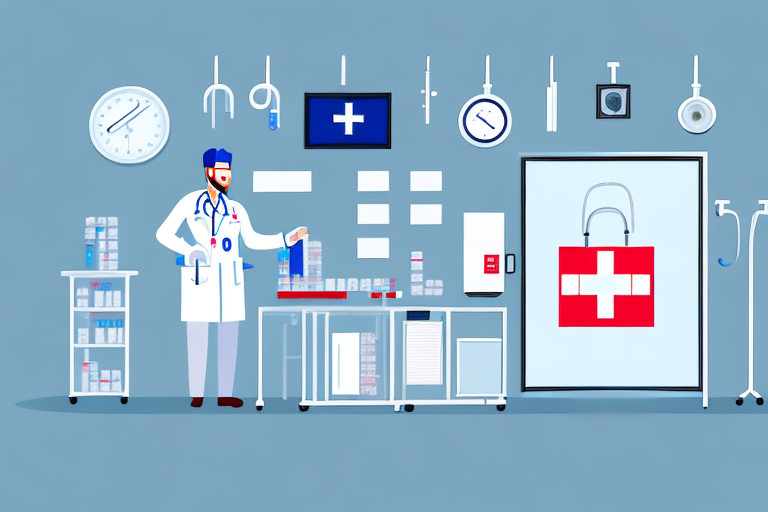Lab Courier Service Software: Streamlining Your Delivery Process
In today's fast-paced laboratory industry, efficiency is paramount. Lab courier service software offers significant benefits by streamlining the delivery process, saving time and money, and enhancing security and traceability. This article delves into the essentials of lab courier service software, including its operation, advantages, key features, and how to select the right software provider.
The Importance of Efficient Delivery in the Laboratory Industry
Efficient delivery is critical in the laboratory sector, where time-sensitive samples and equipment require prompt and reliable transportation. For instance, blood samples collected at hospitals must reach laboratories swiftly to ensure accurate test results. Delays can lead to compromised sample integrity, inaccurate diagnoses, and hindered scientific research.
- Accuracy of Test Results: Timely delivery ensures that samples remain uncontaminated and stable, maintaining their integrity for precise analysis.
- Research Integrity: Prompt equipment delivery prevents delays in experiments, safeguarding research timelines and funding.
- Cost Efficiency: Reducing delivery times minimizes operational costs and enhances overall productivity.
According to a Lab Manager report, optimized logistics can improve laboratory effectiveness by up to 30%, highlighting the significance of efficient delivery systems.
Benefits of Lab Courier Service Software
Lab courier service software offers a centralized platform for managing deliveries, automating tasks such as package tracking, scheduling, and proof of delivery. These automation capabilities minimize human error, enhancing accuracy and efficiency across the delivery process.
Time and Cost Savings
By automating delivery management, laboratories can reduce the need for extensive staff devoted to logistics. Additionally, the software can optimize delivery routes, cutting down on fuel consumption and time spent on the road. This leads to substantial cost reductions and increased operational productivity.
Real-Time Tracking and Monitoring
The software provides real-time tracking of shipments, allowing laboratories to monitor the status of their deliveries at any moment. This transparency ensures that samples and equipment arrive on time and in optimal condition, fostering trust and reliability in the delivery process.
Statistics indicate that real-time tracking can decrease lost shipments by up to 25%, as reported by the Transport Topics Industry Report.
Key Features to Look for in Lab Courier Service Software
Selecting the right lab courier service software involves evaluating several critical features to ensure it meets your laboratory's specific needs.
Real-Time Tracking
Ensure the software offers comprehensive tracking capabilities, providing visibility into the location and status of each delivery. This feature is essential for maintaining the integrity of sensitive samples and equipment.
Automated Scheduling and Route Optimization
Automated scheduling streamlines the delivery process, while route optimization reduces travel time and fuel usage, contributing to cost savings and environmental sustainability.
Proof of Delivery
Proof of delivery features, such as digital signatures and photo confirmations, ensure that deliveries are completed accurately and provide an audit trail for accountability.
Analytics and Reporting
Robust analytics tools enable laboratories to monitor delivery performance, identify inefficiencies, and make data-driven decisions to enhance overall logistics operations.
User-Friendly Interface and Customizability
The software should be intuitive and easy to navigate, accommodating users with varying levels of technical expertise. Additionally, the ability to customize the platform to fit specific laboratory requirements is crucial for seamless integration into existing workflows.
For more insights on selecting the right logistics software, refer to the National Institutes of Health guidelines on transportation management systems.
Choosing the Right Lab Courier Service Software Provider
Selecting a reliable software provider is essential to maximize the benefits of lab courier service software. Consider the following factors when making your choice:
- Customer Support: Opt for providers that offer comprehensive training and responsive customer service to assist with any issues that arise.
- Compatibility: Ensure the software integrates seamlessly with your existing laboratory information management systems (LIMS) and other relevant platforms.
- Data Security: The provider should implement robust security measures to protect sensitive data, including encryption and secure authentication protocols.
- Scalability: Choose a solution that can grow with your laboratory, accommodating increasing delivery volumes and expanding operational needs.
According to a CIO article, evaluating these factors can lead to a 40% increase in software efficiency and user satisfaction.
Implementing Lab Courier Service Software into Your Workflow
Integrating lab courier service software into your laboratory's operations requires strategic planning and execution.
Identify Pain Points
Assess your current delivery processes to identify inefficiencies and determine which software features will address these challenges effectively.
Allocate Resources
Dedicate the necessary resources for implementation, including staff training and potential system upgrades, to ensure a smooth transition.
Establish Clear Procedures
Develop standardized procedures for using the software, ensuring consistent and effective utilization across all relevant staff members.
Successful implementation can lead to significant improvements in delivery accuracy and operational efficiency. A study by the Journal of Operations Management found that effective software integration can reduce delivery times by up to 20%.
Future Trends and Innovations in Lab Courier Service Software
The lab courier service software industry is continually evolving, with several emerging trends shaping its future.
Artificial Intelligence and Machine Learning
AI and machine learning are enhancing route optimization, predictive maintenance, and demand forecasting, further reducing costs and improving delivery efficiency.
Blockchain Technology
Incorporating blockchain can enhance data security and traceability, ensuring tamper-proof records of all transactions and deliveries.
Internet of Things (IoT) Integration
IoT devices enable real-time monitoring of environmental conditions during transport, critical for maintaining the integrity of sensitive laboratory samples.
For an in-depth analysis of these trends, refer to the Forbes Technology Council insights on future logistics technologies.
Case Studies: Successful Implementation of Lab Courier Service Software
Real-world examples demonstrate the tangible benefits of implementing lab courier service software.
Hospital Laboratory in New York
A New York-based hospital laboratory integrated lab courier service software to automate blood sample deliveries. The software provided real-time tracking and optimized delivery routes, resulting in a 30% reduction in delivery times and a 15% decrease in fuel costs. Additionally, the accuracy of test results improved due to the timely arrival of samples.
Medical Laboratory in California
A California medical laboratory faced challenges in managing sample deliveries to multiple testing facilities. By adopting a centralized courier service software, they achieved enhanced visibility and control over deliveries. The ability to assign drivers efficiently and monitor delivery statuses in real-time led to a 25% increase in delivery reliability and a 20% reduction in operational costs.
These case studies highlight the potential for significant improvements in delivery efficiency and cost savings through the adoption of lab courier service software.
Conclusion
Lab courier service software plays a pivotal role in optimizing the delivery process within the laboratory industry. By automating key tasks, providing real-time tracking, and enhancing data security, this software enables laboratories to achieve greater efficiency, cost savings, and reliability in their operations. When selecting a software provider, it is essential to consider factors such as customer support, feature set, and data security to ensure a successful implementation. Embracing lab courier service software not only streamlines workflows but also supports the integrity and accuracy of critical laboratory functions, ultimately contributing to better scientific outcomes and patient care.




















